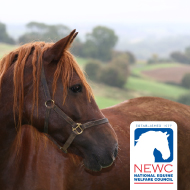
Guides aim to help owners make the decision to keep their horse
Equine charity members of the National Equine Welfare Council (NEWC) have teamed up to produce two practical guides: one to help horse owners to find ways to cut costs without compromising on the care of their animal, and another on making the difficult decision to re-home a horse.
The guides have been launched in response to a rise in calls equine charities are receiving from owners seeking new homes for their animals. With more than one million horses and donkeys living in the UK, the charitable sector has limited space available and says it must prioritise welfare and reduce cases.
Nic De Brauwere, chairman of NEWC, said: “Of course we want to be able to help every horse. But with limited funds and resources available we have to prioritise on those in greatest need.
“By showing how outgoings can be reduced without compromising on the horse’s quality of life we aim to help owners in making the decision to keep their horse and help prevent inadvertent neglect or abandonment. Otherwise, we can help them safely navigate the rehoming route.”
The ‘cut costs not care’ guide is aimed at owners who are considering rehoming their horses because they can no longer afford to keep them. It suggests where sufficient savings may be made to help them keep their horse without making any compromise on health or welfare.
NEWC’s ‘Rehome responsibly’ guide helps horse owners consider the options whether selling, loaning or retiring. It also discusses euthanasia in cases where quality of life is diminishing and rehoming solutions are not appropriate.
Nic continued: “We hope the guides will provide support for horse owners who are facing tough decisions this winter, to help to keep more horses and ponies well cared for and secure.”
To download the guides, visit www.newc.co.uk



 The Federation of Independent Veterinary Practices (FIVP) has announced a third season of its podcast, Practice Matters.
The Federation of Independent Veterinary Practices (FIVP) has announced a third season of its podcast, Practice Matters.